As you might have guessed, ATI's new Radeon HD 4890
videocard is well placed to compete with enthusiast videocards like the
Radeon HD 4870 1GB and Geforce GTS 260 Core 216, as well as the recently
released nVidia Geforce GTX 275. In terms of performance, the Radeon HD 4890 has
the potential to beat all of the above, with its most direct competition
coming from the more-expensive Geforce GTX 285 videocard. These are the fastest
single-GPU videocards available on the
market today, and are all more than powerful to handle gaming on anything less
than a 30"-wide LCD display at resolutions of 2560 x 1600. For smooth gaming
at extreme resolutions like that, a multi-GPU setup is still
the best option.
Compared to the venerable Radeon HD 4870 (RV770), ATI's Radeon HD 4890 (RV790) is
more of a "GPU refresh" than a change in architecture. This means a bump in both
core and memory clock speeds to increase overall performance and memory bandwidth
to 124.8 GB/sec, but not a substantial bump in the sticker price that new GPU architectures tend to command. The RV790's microarchitecture remains largely the same as existing
Radeon 4000-series GPUs: both have 800 stream processing units, both are built on a 55nm
process, both have 256-bit memory interfaces and both use GDDR5 memory. The Radeon HD
4890 is essentially a highly overclocked Radeon HD 4870 if you want
to think of it that way, with a slightly different
power supply design.
In this review PCSTATS will be testing ASUS' EAH4890 HTDI/1GD5/A videocard
which is largely based on the reference card design. The Radeon HD 4890 GPU is
clocked at 850MHz on this card, and accompanied by 1GB of GDDR5 memory that runs at
an effective speed of 3.9GHz (975MHz quad-pumped). The card is PCI Express 2.0
x16 compliant, supports ATI CrossfireX, HDCP, DX10.1, SM4.1, and Unified Video Decoder
2 for HD content decoding.
ASUS' EAH4890 HTDI/1GD5/A PCI Express
x16 graphics card retails for about $270USD / $350CDN / £150GBP
at stores like Newegg and CanadaComputers.What makes the ASUS EAH4890 particularly stand out
from the crowd is a special tool in its overclocking feature set -
GPU Voltage Tweaking.
Using ASUS' SmartDoctor overclocking software, you can adjust the RV790 GPU voltage from 1.312v
to as high as 1.45v to improve the stability of the GPU if you choose to
overclock it. And if PCSTATS own overclocking tests are anything to go by,
pushing the Radeon HD 4890 to 1000MHz core / 1200MHz memory is certainly
within the realm of possibility!
 |
|
ASUS EAH4890
HTDI/1GD5/A Videocard |
|
|
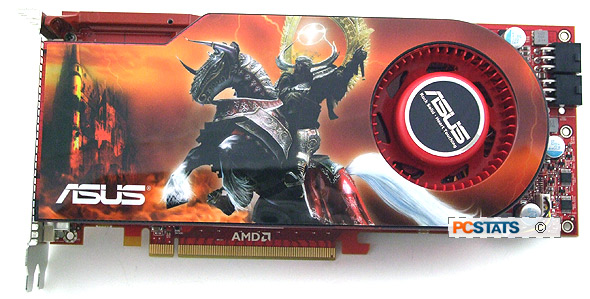
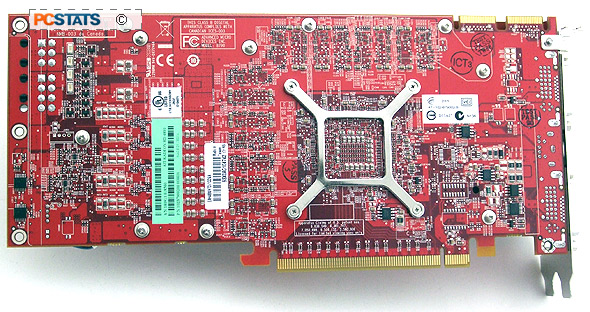
|
| Includes: |
|
User's Manual, Driver CD, Component Output
adaptor, DVI-to-Analog converter, DVI-to-HDMI converter, Composite
adaptor, Crossfire cable, Power adaptor, pleather mouse
pad. |
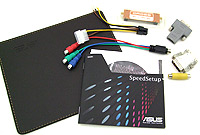 | | |
The ASUS EAH4890 HTDI/1GD5/A is big for a single GPU videocard, measuring 240mm
long and taking up an extra slot for its massive thermal solution
- by comparison the double-GPU Radeon HD 3870 X2 is 270mm long. The HD
4890's heatsink relies on a squirrel cage fan to move air through the hefty block of copper
and heatpipes that form the GPU heatsink. It is cleverly designed so hot
air is expelled out the back of the PC rather than just below your computer's CPU.

Like most performance
videocards the HD 4890 is a bit of hog, it requires two 6-pin
power connectors and comes with one 6-pin-to-molex power adaptor
in case your existing power supply only has a single SLI power
cable available. The card is rated for a max power draw of about 190W, so it's
not surprising that ATI recommend a minimum 500W powersupply, 700W if you anticipate
moving to a dual VGA CrossfireX set up at some point in the near future.
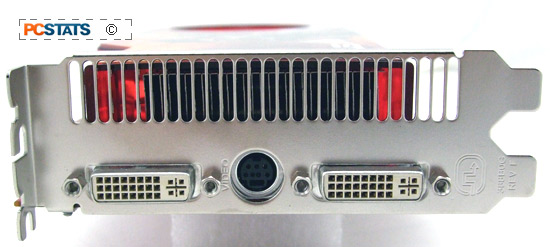
The 65mm diameter PWM controlled squirrel cage
fan is pretty quiet under idle and moderate GPU loads, but when it needs to
it ramps up to a very loud 4700RPM. During testing PCSTATS kept the fan
spinning at 100%, at that speed GPU temp remained below 40C but
it was like sitting next to a vacuum cleaner. It's generally a
good idea to keep the slot immediately below
the videocard empty so the fan won't be drawing in heat from other expansion cards.
Video Outputs and Bundled
Accessories
The ASUS EAH4890 HTDI/1GD5/A videocard comes equipped
with two dual-link DVI outputs, and combination composite video/component
output/s-video port.
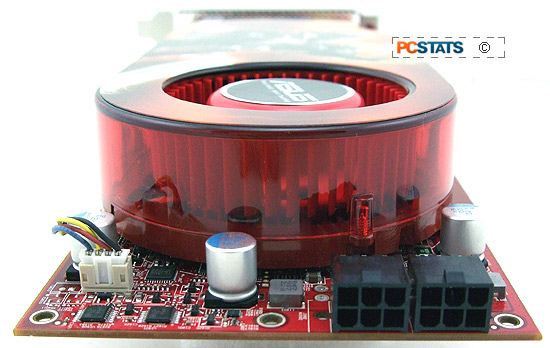
The box includes a DVI-to-VGA adaptor, a DVI-to-HDMI
adaptor, component video adaptor (Y, Pb, Pr), composite video adaptor,
CrossfireX bridge connector, spare power connector and associated CD
manuals and drivers. ASUS have also thrown in a nice pleather mouse pad.
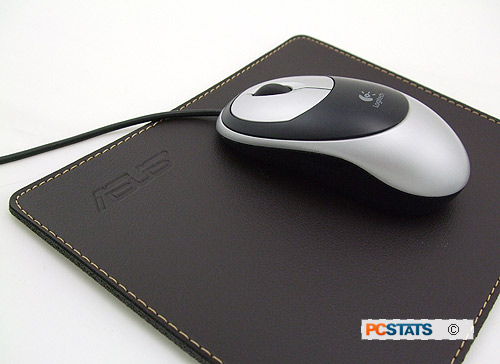
The DVI-to-HDMI adaptor supports 7.1 channel audio
passthrough, in case you wondered. The Radeon HD 4890 supports a maximum
digital resolution of 2560x1600, 2048x1536 for analog CRT monitors.

